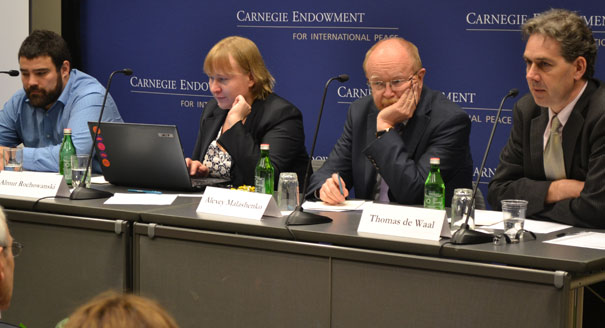Registration
You will receive an email confirming your registration.
Since the Boston Marathon bombings, Russia’s relationship with its Muslim minorities—in particular those from the North Caucasus—has become the focus of intense scrutiny in the West. Ongoing violence between Islamist insurgents and the Russian security forces in the region costs around 700 lives a year. Dagestan in particular, one of the North Caucasus’ most violent areas and a notable center of sectarian struggle and fundamentalist activity, has drawn considerable attention. Carnegie’s Alexey Malashenko, Almut Rochowanski of at the Chechnya Advocacy Network, and Jean-Francois Ratelle, a visiting scholar at Georgetown University, discussed the latest developments in Chechnya and Dagestan and their wider implications. Carnegie’s Thomas de Waal moderated.
Today’s Insurgency
- Low Social Mobility: Dagestan continues to suffer from a high youth unemployment rate coupled with limited opportunities to serve in the armed forces, said Ratelle. He argued that the lack of economic and social opportunities plays a much greater role in the insurgency than Chechen spillover or Salafism. Seventy percent of jobs in Chechnya are in the public sector, added Rochowanski.
- Ideology: Most insurgents are not initially Islamic extremists. The major causes of joining the insurgency are individual desperation, revenge, and often criminal profit, explained Ratelle. Even though the youth is generally not very religious at first, continued harassment by security forces radicalizes them, he added. In Dagestan, Sharia law is becoming more prevalent, Malashenko pointed out.
- Risk of Terror: There is a high likelihood for more terror both in the North Caucasus and abroad, cautioned Malashenko. Most of the insurgent cells in Dagestan are small units, some with a strong criminal dimension, added Ratelle.
The Transformation of the North Caucasus
- New Generation: Rochowanski explained that the median age in Chechnya is twenty-two years old. This young generation is non-Soviet and increasingly non-Russian, said Malashenko. There are increasing links with and interest in the Middle East, he added. Furthermore, there are fundamental tensions between the older and younger generations in Dagestan, stated Ratelle.
- Ethno-Nationalism: There is a local government-financed cultural-religious revival in Chechnya, said Rochowanski. The renewed ethno-nationalism often coincides with historical revisionism and explicit repudiation of federal social laws, she added. Honor killings and curtailment of women’s rights is prevalent in the Chechen Republic and Russian law does not apply here, she concluded.
